#chasms inquiries
Explore tagged Tumblr posts
Note
First Burn - The beginnings of the LeeLuke divorce pre-Elysium
I need to hear more about this one 👀
This one has been in the works for so long despite how little actual writing it has LMAO.
It is gonna start post Lightning Thief, pre-Sea of Monsters. Lee had temporarily left camp to visit his mother (he's normally a year-rounder, but like- he's gotta get used to the human world yk) and they're at the grocery store when Luke just walks up.
Obviously Lee is NOT amused, but his mom thinks Luke is the sweetest thing ever, especially when she finds out they are (soon to be were, Luke just don't know it yet) dating. Lee is glaring at both his mom (lovingly) and Luke (disappointedly) the entire car ride back to their house.
While Lee's mom is cooking, Lee drags Luke up to his room by the ear with the most unamused expression ever. For all the time they were dating, Lee NEVER mentioned where he lived, so he has many questions. But Luke is just staring lovestruck at Lee and asks one question that starts the fire in their relationship. "Will you join me in my fight against the Gods?"
Tbh, I may make a TA Lee au bc I love the concept of "I can make him worse." We'll see. This is the general rundown to start things off, but the lovers' quarrels continue all the way up until pre-BoTL
#Lee will be taking the kids in the divorce#Chris may be the frfr breaking point#i havent decided yet lmao#chasms inquiries#lee fletcher#luke castellan#leeluke
8 notes
·
View notes
Text
Re-tag drop: Yelan
#yelan: ic. [ that's a worst-case scenario. but all too often; the most pessimistic speculation turns out to be the closest to the truth. ]#yelan: inquiries. [ oh? you'd like to know more about me? what will you give in exchange then? ]#yelan: countenance. [ an old friend of mine once privately commented to me that yelan “is always smiling; but never with her eyes.” ]#yelan: introspection. [ like a phantom she appears in various guises at the center of events; and disappears before the storm stops. ]#yelan: meta. [ the chances are if i open this door; there can be no witnesses left alive. is that a sufficient reason for you? ]#yelan: little notes. [ how can things ever be the same again: knowing your life was saved when others weren't? salvation can be a burden. ]#yelan: wishes. [ that which hides inside her… that constant calling; it is the blood of heroes which has been howling for 500 years. ]#yelan: etc. [ every round of finger-guessing is a tiny adventure; and every roll of dice sends sporadic thrills down her spine. ]#yelan: home. [ i'm guessing you've fallen for the rumors about me being very wealthy; having high demands for my standards of living? ]#yelan: yanshang. [ the teahouse has really brightened up after the boss took over and kicked the fatui and gamblers out. ]#yelan: lantern rite. [ every year on this day; the lanterns light up the night. may the fire never die and may humanity endure. ]#yelan: chasm. [ perhaps she will plunge into that darkness one day; and the ill fate that once befell her ancestors shall find her too. ]#yelan: scope. [ i serve ningguang. the tianquan of the qixing. the scope of my work includes some of liyue's biggest secrets. ]#yelan: weaponry. [ water. divided it is as streams uncounted: close yet untangled. united it is as a giant wave: inexorable; unstoppable. ]#yelan: uncle tian. [ there's nothing wrong with wanting to win other people's respect. but when has uncle tian looked down on anyone? ]#yelan: ningguang. [ we both made a mistake: we shouldn't have involved ordinary folk in what we do. / ordinary folk? ]#yelan: xiao. [ you think you're oh-so cold and ruthless. i'm not buying it. - losing one of us so the rest can escape? some victory that is#yelan: keqing. [ if something happens that they didn't anticipate; it throws their plans into oblivion. but the yuheng is different. ]#yelan: ganyu. [ i could never work non-stop like she does. certainly not at that level of efficiency. i guess being half-adeptus has its pe#yelan: yanfei. [ when i help her out; i always get some invaluable leads in return. gotta say though: i think she respects me a little much#yelan: traveler. [ you don't have to be on guard around me. i never scheme against people who have my stamp of approval. ]#yelan: v youth. [ you're still young. be patient. believe in yourself; and don't look outside yourself to prove your value. ]#yelan: v. pre-qixing. [ i don't do these things to help the powerful or mighty get rid of dissident forces. but because water too has a sou#yelan: v. qixing. [ seeing isn't always believing. and if you can't trust your eyes; you certainly can't trust rumors. ]#yelan: liyue. [ liyue will never plunge into disaster without clue of the danger like it once did. she will see that it is not unprepared.#yelan: wriothesley. [ don't fight over fleeting gains or losses. focus on where your heart is leading you and move forward. ] delusionaid.#yelan. [ i can't change the facts. but if it's a choice between the cold; hard truth and blissful unawareness: i'll take the former. ]
3 notes
·
View notes
Text
[3.8] Technology as a False God: On "Evolution," the Duality of Machines, Replication, and Wisdom
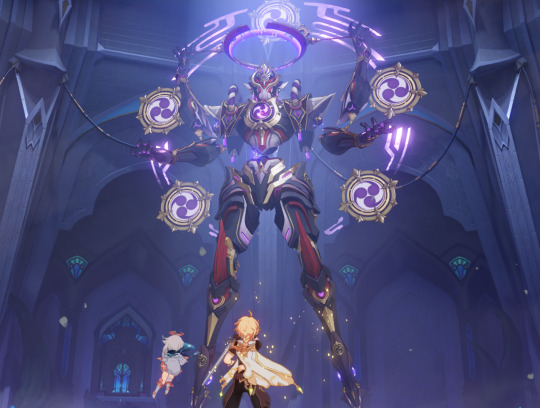
“To recognize untruth as a condition of life: that is certainly to impugn the traditional ideas of value in a dangerous manner, and a philosophy which ventures to do so, has thereby alone placed itself beyond good and evil.” –Friedrich Nietzsche, Beyond Good and Evil
Before we move on to the nation of justice, I want to do one last inquiry into the narrative significance of machines and technology in Genshin’s 3.x patch cycle. Here, I’ll discuss how divinity (or “godhood”) and technology are treated as interchangeable tools to surpass fate and the boundaries of mortality, the potential problems with treating them this way, and propose an alternative relationship between humanity and technology as illustrated through Karkata, Benben, Tamimi, and Mehrak. By foregrounding machines, we learn something intriguing about ourselves and the “truth” of this world as we perceive it.
SPOILERS: All Sumeru Archon Quests, Caribert, the Golden Slumber and one out-of-context screenshot from Dual Evidence, the Dirge of Bilqis and its post-quests, Khvarena of Good and Evil, Nahida’s second Story Quest, Faruzan’s hangout, an out-of-context screenshot from Baizhu’s Story Quest, and major spoilers for Persona 5 strikers at the end. Also some dialogue from Shadows Amidst Snowstorms and A Parade of Providence, two limited-time events from 2.3 and 3.6 respectively.
Disclaimer: I have tried my best to write this post so that it stands on its own, but because it is still a sequel it will probably make the most sense with the context of part 1. Here are the previous posts leading up to this one:
Part 0: On Dreams, the Abyss, Forbidden Knowledge, and Wish Fulfillment
Part 1: The Uncanny, Fate and the Machine
Terminology: Machine is sometimes used interchangeably with “technology” in this post.
Technology or tool here is referring to technologies specifically used to pursue a wish like immortality in the face of existential dread, not the use of technology or medicine (which I do not address here, and is very difficult to separate from the former) to facilitate someone’s life who could otherwise not survive without that technology, or would have a more painful lived experience without it.
Also, though I don’t engage directly with “A Cyborg Manifesto” here, Donna Haraway’s ideas have greatly influenced my own over the years since I read her in college (although I mostly disagree with her on many points, or at least don’t go as far in boundary deconstruction as she does). I owe my interest in technology studies to her and that piece. Her essay is linked here and at the bottom if you would like to read it.
(and finally with many, many, many thanks to my boyfriend for multiple beta reads despite not having played a single Hoyoverse game, helping me work out the philosophy bits and contextualizing them in history, and encouraging me to finish this)
TL;DR: Machines are friends, not food!
No Matter the Cost
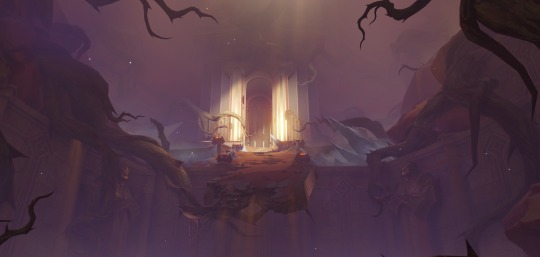
“...Perhaps it is as the notebook says, and we can find a power that transcends even that of the Abyss — the power of ‘evolution’...” -Records of Unknown Attribution (I) “Life, death... and the world around us all follow a set of laws... Hehe, but if you never test the limits, how can anyone know where the boundaries of these laws are?” -Baizhu Voicelines, Chat: Natural Laws “...Even the ominous thing that came down from the heavens shall be ours to use…” -Hyglacg, Shadowy Husk in the Chasm
Without a doubt, the star of this patch cycle is Khaenri’ah, which lurked in subtext and allegory in the Archon Quest, haunted Sumeru’s landscape with its massive defunct Ruin Golems, and finally smacked us in the face with its physical location in Khvarena of Good and Evil..
We already know that Khaenri’ah was a nation that put its faith not in the gods but rather in human ingenuity and technology, and that they ultimately attained a power so great that they “almost touched the dome of the firmament.” They did this by researching increasingly dangerous energy sources for their numerous mechanical creations, the Ruin Machines we are all too familiar with by now. They started out with Azosite, a Ley Line-based elemental energy source that powered their earliest Ruin Guard models, like those scattered around Devantaka Mountain.

Nasejuna: This giant furnace is used to make a substance known as Azosite. It is the core of this entire factory, and the Energy Blocks we saw earlier were derived from this place.
But this energy source proved inefficient and therefore inadequate for Khaenri’ah’s goals, which led them to seek a higher power from beyond the skies that could fuel their larger machines with perpetual energy. This likely is the bridge between Khaenri’ah’s fate and Chlothar’s mysterious remarks in Caribert about the Abyss Sibling:
Chlothar: We once believed that you would bring new strength and hope to Khaenri'ah. Chlothar: To us, you were the Abyss... A wondrous mystery far beyond our imagination and comprehension... Chlothar: ...And the one who controls the Abyss can control everything! Chlothar: We yearned for that future. We looked to you to take us there. Chlothar: But what did you bring us instead?
Though Khaenri’ah presents itself proudly as a godless nation, it may have been founded around the time when the celestial nails dropped in Teyvat’s first forbidden knowledge pollution event, which destroyed the unified human civilization. As potential survivors of this devastating act by the Primordial One, Khaenri’ahns then settled in a lifeless land without plants or animals of its own, and they hoped to build something there that belonged solely to humanity. The Heavenly Principles had turned on the world’s earliest humans, and they were powerless against them. Chlothar’s words betray the scars of this trauma on Khaenri’ah, as well as their desperation to control their fate by looking to the Abyss.
As a brief refresher from the previous part, we discussed how the German word heimlich denotes “the home,” all that is familiar and known, while unheimlich (uncanny) refers to all that is unfamiliar and external to the home, such as the wilderness. The Abyss sibling and the Traveler are external variables to Teyvat, making them otherworldly, unfamiliar entities full of potential to surpass Teyvat’s natural laws. Although the Abyss sibling is not a god per se, they were probably as close to a god as Khaenri’ah ever had, because to them the sibling embodied the higher power they were searching for, and they saw that “godliness,” a sort of functional divinity, was yet another technology for them to master. In this way, the Abyss sibling (and their functional divinity) was a powerful tool for Khaenri’ah’s desired end, the “future they yearned for,” a being who could deliver them to the end of their suffering under the Heavenly Principles.
It’s similar to what King Deshret represented to Rahman and the radicals in Archon Quest. The hopelessness of Sumeru’s situation before the Archon Quest’s conclusion is an allegory for the position humanity finds itself in under the rule of the Heavenly Principles, with the Akademiya symbolizing Celestia and the desert dwellers symbolizing Khaenri’ah. The material consequences of the Akademiya’s rule on their lives created a dangerous situation for the desert, and those most desperate to change their fate were willing to believe in the impossible:
Dehya: …The rougher life gets, the more they wanna believe in King Deshret. Way they see it, King Deshret’s resurrection is their only chance at overthrowing the Akademiya. … Dehya: Sumeru is run by wise and mighty sages. To them, us desert dwellers are nothing but tools that can be used and discarded at their whim. Dehya: We’re cheap labor. Like livestock, but easier to control…Nothing more. …
Rahman: We’ve waited a long time for this day to come… The sun and the moon no longer shine here. All you see now is cracks in this desiccated land. But, fate has finally dealt me a hand to play against the Akademiya.
Rahman: With these scholars in our custody, we’ll stomp the Akademiya’s forces and fight our way beyond the Wall of Samiel.
Like the Abyss sibling, Deshret’s divinity is both a nebulous symbol of hope and also the means to an end, a tool or “technology” for surpassing fate.
Celestia is untouchable, unconcerned with mortal lives, and the boundaries that govern humanity leave no room for them to negotiate their rule:
"Resolve, valor, love, hate...they will all twist in the river of time. But the 'rules' will never change." –Magatsu Mitake Narukami no Mikoto, Living Beings
Instead of bowing to Teyvat’s laws, Khaenri’ah pushed them to their limits. The cost of their failure spelled the end of their nation as they knew it, polluting Khaenri’ah and Teyvat with forbidden knowledge again.
And speaking of forbidden knowledge pollution, let’s talk about Apep’s role in Nahida’s second story quest, because if all that wasn’t enough, the metaphor becomes quite literal in Apep’s case. Nahida’s second story quest is many things, all of which will be extremely important in Fontaine when we deal more directly with the idea of forms, the Self, and mirror images, but its most useful application to both Sumeru’s story and the overarching main story is the allegory of Apep swallowing Deshret.
In exchange for allowing him to establish his kingdom in the desert, Deshret promised to pass all of the knowledge he learned to Apep once he died. When that day did come, Apep literally ate Deshret’s body in order to assimilate his knowledge (or memories) into its body. Little did Apep know, this was all Just As Deshret Planned, and its body became a containment zone for the lethal forbidden knowledge he accumulated after the Goddess of Flowers’ death.
Apep’s goal was, and still is, to overthrow the Heavenly Principles that took Teyvat from it and the other Sovereign dragons, and using Deshret’s knowledge was yet another stepping stone to achieving this goal. Seems a little similar to Khaenri’ah, right? It’s even in the title of its boss music: “God-Devouring Mania.” This idea of not just utilizing divinity as a tool, but also metaphorically consuming it as an energy source, like a predator would consume its prey, is crucial to understanding its purpose as an aid in a larger project of “evolution.” (Edit: in other words, it’s all about power).
Drink Not That Bitter Salt Water
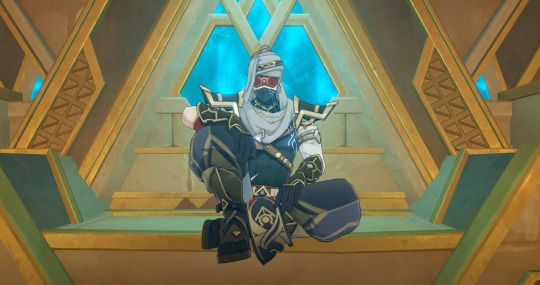
“Flesh decays, and with it decay all martial arts mastery and all poignant memories. Perhaps only by converting one’s four limbs and body into sturdy mechanical parts, and by at last sacrificing one’s very own heart for a sophisticated mechanical one, can one transcend the impermanence of the fleshly form…” -Marionette Core Item Description “A reptile that has mutated after feeding from greater lifeforms. Majestic beasts are sometimes revered by human beings as the embodiment of a greater power, their visages turned to analogy to feed in reference to a person, feeding their ego. However, the majority of beasts that have absorbed the "greater power" were slain by the overwhelming nature of the power itself. Only a few among their number evolved new forms.” -Consecrated Horned Crocodile, Living Beings Video still from WoW Quests
As it turns out, the relationship between divinity and technology to humanity is not just unidirectional, but interchangeable. Let me show you what I mean.
In the Golden Slumber world quest, the Traveler wanders through the ruins of King Deshret’s civilization in search of a novel area of research for Tirzad’s paper with Jebrael and Jeht, two members of Tirzad’s hired investigation team. In the depths of King Deshret’s mausoleum, they stumble upon Samail, who is collaborating with the Fatui to locate King Deshret’s secret, the Golden Slumber.
At the conclusion, Jebrael and Samail actually reach that “place” after arriving at Deshret’s throne in Khaj-Nisut. In order to save Jeht, Tirzad, and the Traveler from the encroaching Golden Dream, Jebrael joins Samail in the sea of consciousness:
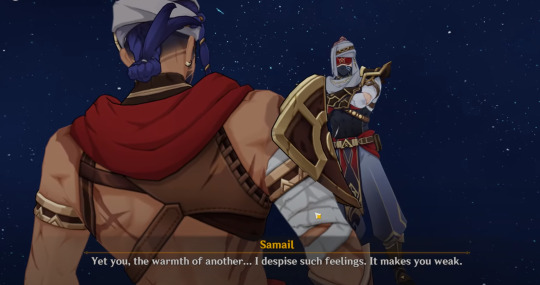
Jebrael: I'm inside... the Golden Slumber promised by Al-Ahmar? Samail: Oh... You are not "us" yet. Samail: ...It's fine. Soon, there'll be no "you." "You" will become a part of "us." This meaningless talk will be unnecessary then. … Samail: You should obey. Al-Ahmar's will is our will. The Thutmose's dreams are our dreams. Jebrael: No! Ufairah taught me that I'm not just some part of you, I'm an independent person! I have my own dreams... I won't go back! Samail: Jebrael, why don't you understand? Love is just a fever. I even eliminated the infection for you. Has the heat made you lose your mind? Jebrael: You're the one who's lost their mind, Samail, not me. The Golden Slumber that Al-Ahmar promised us isn't like this... It's not a sad place with only "we" and no "I." Samail: I'm not sad. I know what I want. My dream is to be one with the Thutmose. Samail: Yet you, the warmth of another... I despise such feelings. It makes you weak. Video still from WoW Quests
When they worked under Babel, Jebrael saved Samail from an assassin Babel sent in their exploration of Gurabad. Classified as traitors of the Tanit, Samail and Jebrael then founded the Thutmose Eremite faction together and were the only meaningful connection each other had until their first attempt to uncover Deshret’s secrets. On this expedition, Jebrael met Ufairah and had their daughter Jeht together, further pulling him away from the Thutmose and from Samail. Samail then kills Ufairah in one final attempt to make Jebrael stay, but even this is not enough, and Samail fails to “possess” him in the end.
Samail’s loneliness and despair then drove him further toward the Golden Slumber of his dreams, where he would never truly be alone again. He resents Jebrael’s attachments to the material world and likens them to an illness because these attachments are what make him an individual and prevent him from returning “home.”
It doesn’t really matter to Samail what King Deshret’s original intent for the Golden Slumber was, because he needed to appropriate the project for his own subconscious wish, his own intent to transcend his flesh and become “one” with his departed god’s dream, indeed to merge with Deshret himself. If rationalizing this wish required confounding it with Deshret’s, so be it. With the Golden Slumber’s technology, he could consume everyone and everything.
Rahman and the radicals relied on both the technology that (falsely) promised Deshret’s resurrection and Deshret himself to deliver them a brighter future, but here Deshret and his technology are more difficult to separate from one another. His divinity is technology in this sense, and using that technology allowed Samail to surpass the boundaries normally imposed on mortals. Though his and Jebrael’s bodies died in the material world, their consciousness is now infinite in the Golden Slumber.
Babel’s motives in the Dirge of Bilqis were also quite similar to Samail’s. After opening the path to the Eternal Oasis, her true intentions to monopolize the oasis and overthrow the Akademiya came to the surface:
Babel: Whether she is alive or dead, whether she can or cannot be resurrected... As long as the Eternal Oasis is under my control, all such things will be mine to decide. Babel: I shall be the sole Prophetess of the slumbering goddess, the Tanit's law shall be divine edict, and the prosperity of the Tanit shall be the pre-ordinance of her divine oracles.
In the Golden Slumber and the Dirge of Bilqis, the focus shifts from what a god can offer humanity to what their technology alone can offer. Though this distinction is subtle, it is important for solidifying that technology is not only a tool humans use to appropriate divinity, but that it is also seen as a form of divinity itself. What Babel and Samail hope for is not to resurrect a god or to create one, but in effect to become a god through their use of technology. To humanity, divinity is a technology, and in technology it sees divinity.
God Devouring and Rheingold* Gathering
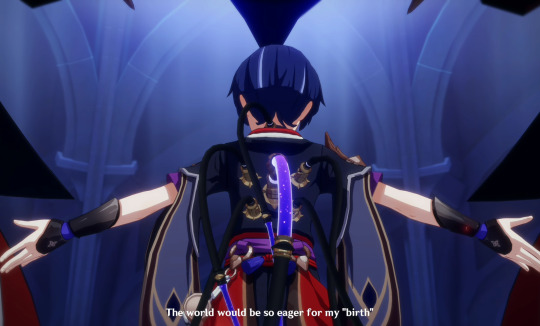
“An arthropod that has mutated after feeding from greater lifeforms. Lifeforms are governed by the laws of evolution, Consecrated Beasts exploited these rules by being fortunate enough to discover a long-dead carcass of a greater being before any of their competition ever did. Animals and humans often have far more in common than the latter is willing to acknowledge.” -Consecrated Scorpion, Living Beings “...Zandik and I discussed the traits of local plants and animals. We also exchanged views on their evolution models. We had a great time and decided to go on a picnic tonight…” -Sohreh’s Note
So, why machines? Why is technology the vehicle of choice to consume divinity?
To start off, machines present a fascinating ontological dilemma for humans. Let’s begin with the first problem they pose.
Although there are many ways to embody a human experience, what all humans have in common is a finite lifespan. The impermanence of life, and our awareness of that impermanence, is central to the existential question of the meaning of our existence. In our attempts to locate that meaning, some turned inward and asked: what makes humans different? And Cartesian dualism answered: humans are different because we have an immaterial soul that allows us to reason.
However, in L’Homme Machine (Man a Machine), French materialist and ex-physician Julien Offray de La Mettrie posited another theory of the body that ran counter to this narrative. Very generally speaking, materialism is the philosophical view that all phenomena are a result of matter and material interactions. To materialists, matter is the fundamental nature of reality itself – if it is not composed of matter, it doesn’t exist. He not only saw the body and soul as one and the same (what philosophers call monism), but also as analogous to a machine, a view that Descartes reserved only for non-human animals. In other words, Descartes argued that thought originates in an immaterial “mind,” while de La Mettrie reasoned that we think through our bodies, and that this makes us no different from other animals or a machine.
Though his examples weren’t especially scientific, the move to extend Descartes’ analogy back to humans is upsetting to some due to the lack of privilege it affords the human subject. If a human is no different from other animals, if there is no immaterial soul or “mind” that distinguishes us from them, then what makes humans special at all? In de La Mettrie’s words:
“We are veritable moles in the field of nature; we achieve little more than the mole’s journey and it is our pride which prescribes limits to the limitless. We are in the position of a watch that should say (a writer of fables would make the watch a hero in a silly tale): ‘I was never made by that fool of a workman, I who divide time, who mark so exactly the course of the sun, who repeat aloud the hours which I mark! No! that is impossible!’ In the same way, we disdain, ungrateful wretches that we are, this common mother of all kingdoms, as the chemists say. We imagine, or rather we infer, a cause superior to that to which we owe all, and which truly has wrought all things in an inconceivable fashion (de La Mettrie, 146).”
This “uniformity of nature” (de La Mettrie, 145) has a horrific quality to humans. We assert that we are better than what has created us, that we are superior to other animals, in order to repress the despair of a meaningless existence. It is in no small part what motivates Scaramouche to offer his mechanical body as a test subject in the god creation project, so that he too could attain his destiny:
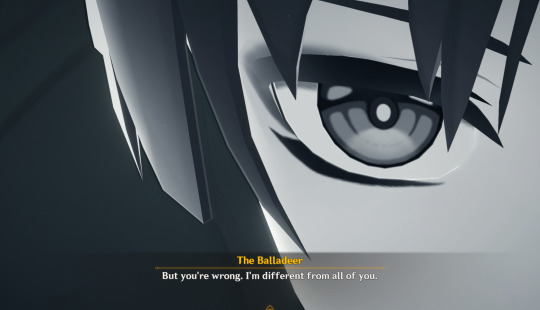
The Balladeer: But you're wrong. I'm different from all of you. The Balladeer: I was born to become a god. My entire life up until this point has just been a meaningless routine. The Balladeer: Just think about a sheet of paper... By itself, it holds no meaning. The content recorded on it is what gives it value. The Balladeer: All "I" had recorded down before were some painful memories and boring human feelings. Such senseless drivel should have been erased a long time ago.
This brings us to the second problem. In 1970, roboticist Masahiro Mori proposed a curve to measure the “affinity” we feel while gazing upon increasingly humanoid machines. He placed industrial robots at the beginning of the affinity curve and a healthy person at the end to demarcate a continuum of similarity between the machine and a human’s appearance. Near the end of the curve, our affinity for machines suddenly drops into an abyss. This drop is the Uncanny Valley effect, where an android’s similarity to a human is almost perfect, but ultimately fails to maintain the illusion that it is not a machine, creating a deep discomfort or “lack of affinity” for them. Mori thought these not-quite-human machines elicit a similar level of discomfort in us as corpses and zombies, which he placed at the very bottom of the abyss.

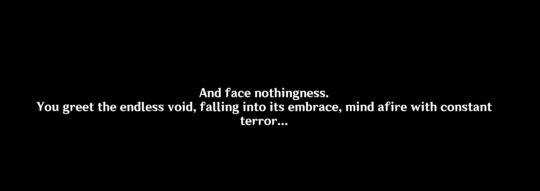
The uncanny Goddess of Flowers in the Dirge of Bilqis
Corpses frighten us because they are dead, and zombies frighten us because we know that dead things are supposed to be still. If we see something that we interpret as “dead” is capable of independent movement, then that movement could only be an act of god, if that “thing” is not a god itself. We associate uncanny machines with death because they remind us of something we once knew intimately, but have repressed and forgotten in order to maintain our own sanity: the very fact of our mortality. This is what makes them both mesmerizing and terrifying.
And therein lies the dilemma: as our mechanical reflections, androids remind us of death, but as their creators, their existence brings us closer to god, a “proof” of human superiority. It is precisely because we have compared our bodies to machines at all, that we have mechanized the body so thoroughly, that an android can even be built. Through them, we pursue an infinite form:
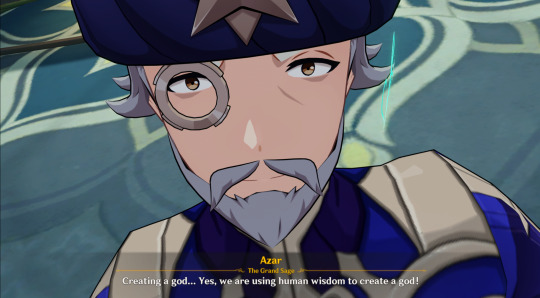
Azar: Creating a god... Yes, we are using human wisdom to create a god! Azar: If humanity cannot attain omniscience and omnipotence, then we shall create a god to reveal them! This is the pinnacle of human wisdom. Azar: We shall regain a god's guidance at long last. No longer will we flounder in the interminable void of consciousness and knowledge. Azar: Even Irminsul will be freed from its plight. Azar: For our nation of scholars, this is the ultimate aspiration — no cost is too great to realize it.
Because of this, it is not surprising in the slightest that Shouki no Kami, the pinnacle of Scaramouche’s Shinjification and most overt reference to Neon Genesis Evangelion, is also an android-like being, a truly “mechanical god.”
Of course, no foray into this well-worn science fiction trope is complete without at least one mad scientist character. Dottore shares a few characteristics with de La Mettrie that are worth noting: they are both doctors, and they were both condemned and driven away for their research. However, Dottore’s defining trait and key difference from de La Mettrie is his flagrant disregard for humans and the boundaries of life:
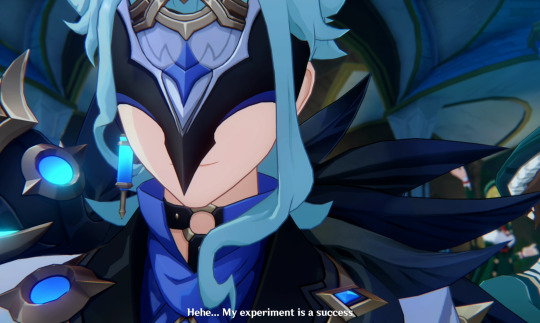
“If we put them to good use, cognition, complex memories, and irrational fantasies shall become controllable variables with which we can alter human individuals. As for the controllable dream, it has huge potential for both civil and military applications, and might even elevate human intelligence to a whole new level. If the plan goes well, mankind will obtain the power to conquer both reality and dream, and truly transcend the earthly boundaries we are born with. ” -Ragged Records
As someone who has achieved self-duplication and is capable of shapeshifting, Dottore can hardly be considered just a human anymore. Instead of entertaining the question of whether or not humans are special, Dottore’s research asks yet another: if divinity can be consumed and assimilated by humanity, then what makes gods special?
Empyrean Reflections
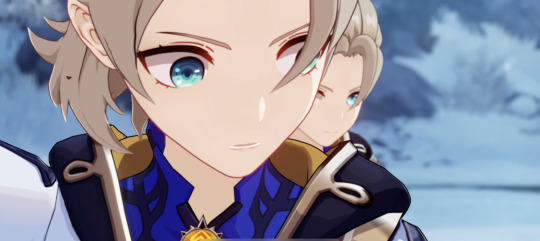
“If man realizes technology is in reach, he achieves it. Like it’s damn near instinctive.” -Motoko Kusanagi, Ghost in the Shell (1996) “Among the lost ancient kingdoms, there was a group of people who were obsessed with the idea of mimesis…these people believed that they might all be replicated and modified to the point where they had surpassed their counterparts. By this means, a superior and unsullied bodily form could replace the continuously decaying and shattering order.” -Chaos Bolt Item Description
The consequences of this perspective are severe. When we revere technology as if it were a divine being itself, depersonalizing it as though it wasn’t created with human hands, technology then appears as if it is an authoritative source of truth, like the Akasha. But in the same way that androids are imperfect reflections of humans, technology can only ever approach the divine, but never touch it. It is an imperfect reflection because technology is changeable, just like meaning:
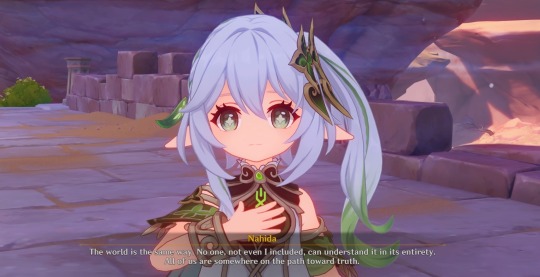
Nahida: Put it this way instead. Truth, to me, is like a shroomboar. Nahida: Some people only see the mushroom on the Shroomboar's back, and they conclude that a Shroomboar is a mushroom. Nahida: Others see only the Shroomboar's body, and they declare that a Shroomboar is a boar. Nahida: Still others look deeper inside, and determine that a Shroomboar is... meat. Nahida: These conclusions are all correct in their own way, but none of them objectively describe the Shroomboar. … Nahida: The world is the same way. No one, not even I included, can understand it in its entirety. All of us are somewhere on the path toward truth.
Meaning can only approximate truth, and while this doesn’t make meaning any less important, it’s equally important to recognize it for what it is: a perspective, an interpretation. It’s like Scaramouche as Shouki no Kami - he was an amalgamation of what Scaramouche thought constituted a god, what the Akademiya thought constituted a god, and what Dottore thought constituted a god, but no matter which angle you view him from, he was still a “false god.” The technology we build in “God's” image is ultimately a reflection of our own understanding of divinity.
A reflection retains the original’s “essence,” and that essence reflects a deeper truth about ourselves, what drives us, and our desires. In Beyond Good and Evil, Nietzsche posits that our desires are the origin of not just emotions, but of all organic processes that allow life to sustain itself and grow (Nietzsche, 35). In other words, Nietzsche thought the impulses associated with desire are the basis for life and constitute our “will,” that will is the causality of all effects, that all will is “Will to Power,” and that Will to Power is the “essence” of the world (Nietzsche, 74). Will to Power then serves as an organism’s most basic instinct, and it is through this instinct that they assert not just their will to live, but also their will to dominate and multiply (Nietzche, 13).
This brings us to the two different main styles of automaton enemies, King Deshret’s Primal Constructs and Khaenri’ah’s Ruin Machines. If we look at them as reflections of some deeper truth about their creators, as well as a manifestation of their creator’s “Will to Power,” or desires, they can help us understand how their creators saw the world and their place in it.
King Deshret’s created his machines to construct an earthly paradise in the desert, and as such they hold titles like architect reshaper and prospector. Although they can attack you, the smaller machines were not intended to be a line of defense in any way - their purpose, just as Deshret saw his own purpose as a god-king, was to terraform, or at least construct a domain on the land as he saw fit to his “elegant and precise” rules. They also reflect how he saw the Heavenly Principles: gods who shaped the world to their liking. This can be seen in the Staff of the Scarlet Sands’ lore where Deshret describes the “natural history” of Teyvat beginning with the creation of the sun and the moons.

As for Khaenri’ah’s Ruin Machines, their models vary significantly from their humanoid to biomimetic forms, but most of them are expressly created with militaristic intent. In “Ancient Kingdom Guardians,” it’s stated that the biomimetic machines such as the crab and jellyfish were a part of Khaenri’ah’s project to create a “mechanical ecosystem,” positioning their creators as both divine beings and military generals. The humanoid models, on the other hand, point to another duality in how Khaenri’ahns view themselves. They are simultaneously symbols of empowerment and disempowerment, signifying both Khaenri’ah’s technological superiority (as “creators”), and their insignificance to the Heavenly Principles as nothing but tools (as mortals, and therefore expendable). As a result, Khaenri’ah’s Field Tillers have a single purpose: to destroy and outlast all, clearing the way for new seeds to sprout, with Khaenri’ah as the new world’s gardeners, just as the Heavenly Principles did.
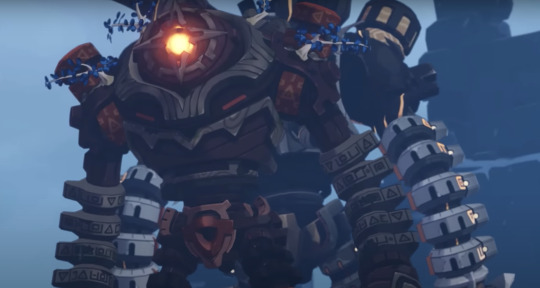
From “Ancient Kingdom Guardians: Behind the Scenes of the Creation of Ruin Monsters.”
So, from this examination of Deshret’s and Khaenri’ah’s mechanical reflections, what “truths” do we learn about the world they’re responding to? In response to their existential despair, both Deshret and Khaenri’ah created automatons to perform tasks that could wrestle control back from the Heavenly Principles. Deshret wanted a paradise of his own making, Khaenri’ah wanted an army. There is a larger “truth” about Teyvat that both of these automaton types reflect as the manifestation of their creators’ “Will to Power,” and Albedo tellingly expressed it in mechanistic language during Shadows Amidst Snowstorms: there is an instinct in living beings to replicate and replace. This is what is meant by the “continuously decaying and shattering order,” which is maintained by the recursive process of remembering and forgetting:
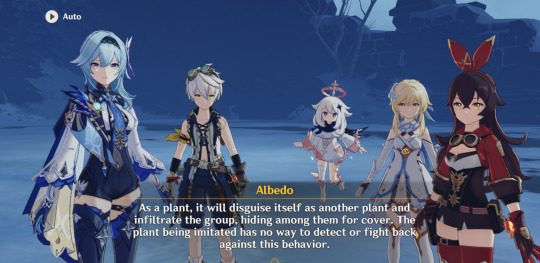
Amber: But... what was its purpose? Was it just trying to get rid of us? Albedo: ... Albedo: I have a preliminary hypothesis on this. Albedo: Whopperflowers are masters of mimicry, and those we encounter in the wild often appear in the vicinity of the plants they impersonate. Albedo: In other words, the whopperflower likely has an instinct to "replicate and replace." Albedo: As a plant, it will disguise itself as another plant and infiltrate the group, hiding among them for cover. The plant being imitated has no way to detect or fight back against this behavior.
Maybe I’m wrong and Khaenri’ah really did intend to rewrite fate for all, doing away with the “heavenly order” of the world itself. But another small part of me thinks this is not the case, and that it’s more likely the Cataclysm was a consequence of their failure to replicate and replace the Heavenly Principles.
In the last section, I mentioned that Dottore and de La Mettrie had a key difference despite their similarities, and that is the conclusion they each came to in response to their findings. Dottore’s response to mundanity is thinly-veiled despair. His contempt for humanity and his test subjects is indicative of the powerlessness he feels not just as someone similarly constrained by life’s boundaries (at least, once upon a time), but also because his attention to and curiosity about these boundaries is condemned by those around him. As the Akademiya’s “outcast,” he then fully turned his attention toward surpassing those boundaries:
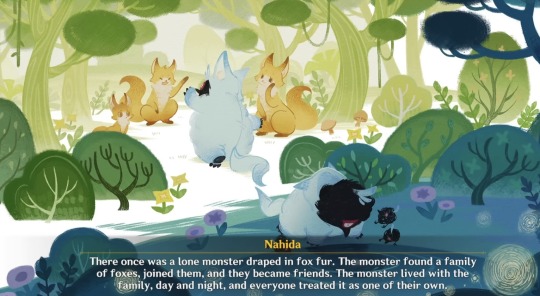
Nahida: There once was a lone monster draped in fox fur. The monster found a family of foxes, joined them, and they became friends. The monster lived with the family, day and night, and everyone treated it as one of their own. Once in a while, the monster would take off its fox fur at night, and lament to itself as it gazed at its reflection in the water: “I am a monstrosity, and yet they are too foolish to see it…I pity them.”
Though he is fictional, Dottore’s real life counterparts are easy to spot. They like to talk about “the singularity,” simulating consciousness on a computer, and other technologically-driven pursuits of immortality. They despise the body as something that can only decay, and instead place their faith squarely in the virtual.
However, de La Mettrie didn’t think mundanity was a terrible fate for humanity. To him, rejecting the “nature” reflected in us is precisely what brings despair:
“What more do we know of our destiny than of our origin? Let us then submit to an invincible ignorance on which our happiness depends. He who so thinks will be wise, just, tranquil about his fate, and therefore happy. He will await death without either fear or desire, and will cherish life (hardly understanding how disgust can corrupt a heart in this place of many delights); he will be filled with reverence, gratitude, affection, and tenderness for nature, in proportion to his feeling of the benefits he has received from nature; he will be happy, in short, in feeling nature, and in being present at the enchanting spectacle of the universe, and he will surely never destroy nature either in himself or in others” (de La Mettrie, 148).
Friend, or Foe? Or Both?
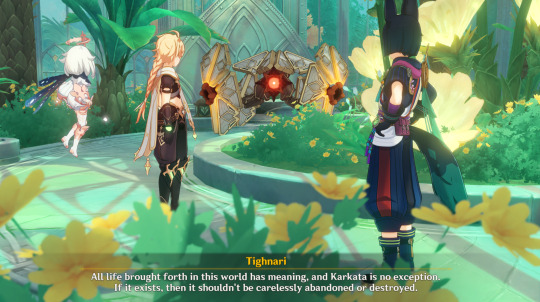
Tighnari: All life brought forth in this world has meaning, and Karkata is no exception. If it exists, then it shouldn’t be carelessly abandoned or destroyed. "’I had a very, very long dream…in it, people were holding hands, dancing in a circle, be they sages or fools, dancers or warriors, puppets or statues of gods…that dancing circle embodied everything about the universe. Life has always been the end, while it is wisdom that shall be the means.’" —Nagadus Emerald Gemstone Description
As we’ve seen, the relationship between humanity and technology is troubled with exploitation and the specter of war. Nearly all autonomous machines in this game were designed to conquer nature in some way, and even Khaenri’ah’s “ghost” lingers in the form of wandering war machines. This is also reflective of a historical pattern in real life, where the impetus for large periods of technological development has often been for the purpose of war and economic domination. With these truths in mind, what could be gained from trying to rewrite this relationship? And what exactly would this effort require?
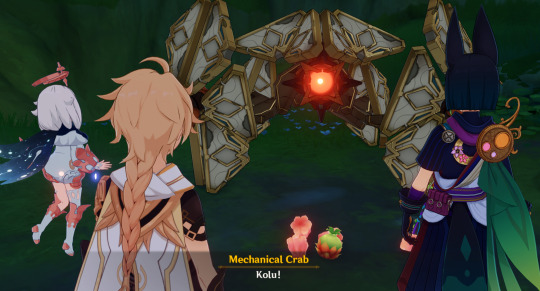
Karkata brings Tighnari, the Traveler, and Paimon some food in the Contaminated Zone.
As a case study, let’s look at how Karkata and Tighnari met. Karkata is Abattouy’s creation, an ambitious foray into the unknown in the field of mechanical life form research, which was forbidden due to the cruel experiments researchers performed on animals to illustrate their theories (fun fact: an IRL example of this can be seen in L’Homme Machine!). Abattouy was expelled for this research, but he continued to work on Karkata in secret until his untimely death. In the tapes that Tighnari and the Traveler find in his secret lab, Abattouy repeatedly laments the lack of a common language between him and Karkata, which can only “understand” the instructions Abattouy has successfully installed, such as its self-repair module, and he doubts Karkata is capable of caring for him outside of these instructions. His single-minded goal is to make Karkata understand him, the organic life form, and his mode of language.
The cruel irony is that after Abattouy passes away from the Ley Line contamination, Karkata exhibits an unexplainable behavior – it starts stealing mechanical parts, not to repair itself and its degrading parts, but to repair Abattouy’s lifeless body:
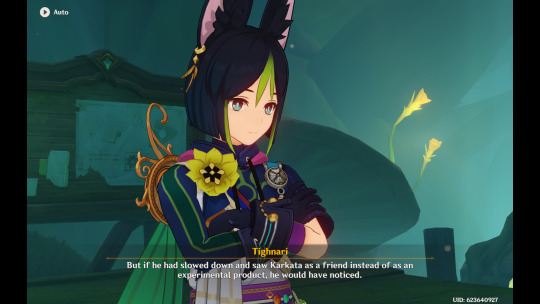
Tighnari: After Abattouy's unexpected death, the mechanical monsters were driven by their "instincts" and continuously drew out power from the Ley Line Extractor. This eventually resulted in severe damage to the Ley Lines. Traveler: Then, Karkata... Paimon: Paimon understands, then why didn't Karkata go haywire like the other machines? Tighnari: Because Karkata is different from the other machines. Tighnari: To Abattouy, for a machine to truly be considered a mechanical life form, it must possess features similar to any other living organism... It should be structured similarly, it must be able to cry and laugh, and it must have the capacity for independent thought... Tighnari: Perhaps only by building such a machine could he have the Akademiya acknowledge his protracted research. Tighnari: But if he had slowed down and saw Karkata as a friend instead of as an experimental product, he would have noticed. Tighnari: Karkata can't speak, and yet it cares about Abattouy far more than it does about itself.
The technology that the Akademiya values the most is technology that replicates organic life, but Karkata defies and confounds these expectations by occupying the space in between a war machine and this idealized mechanical subject. Karkata does more than just reflect humanity: it takes care of it. Similarly, Benben, Tamimi, and Mehrak retain their unique identities as mechanical life forms while assisting their human companion with some task. To be clear, none of these human characters understand how these machines work inside and out. Their partnership is an effort based on trial and error, a mutual deconstructing of each other as beings so unlike themselves. The potential for misunderstandings always remains. Still, there is no devouring to be found here, no blending boundaries between human and machine with selfish intentions, just mutual commitments to learn how to live together.
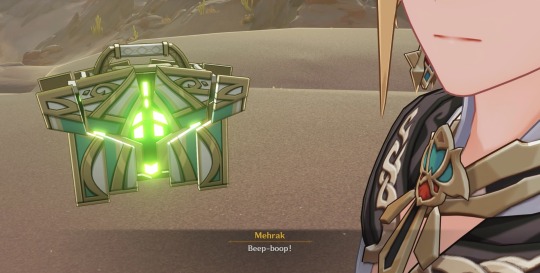
Machines are friends, not food.
When a loud few claim that completely transcending the flesh and embracing virtuality is humanity’s ultimate destiny, a future that could truly be called “post-human,” a quiet wish for coexistence with technology feels more revolutionary than it ought to. The lessons from Karkata’s, Benben’s, Tamimi’s, and Mehrak’s respective stories are an appeal to that mundane future. These strange machines and their human partners are fantastical representations of an idealized relationship between technology and humanity.
To put it another way, let’s take a very brief look at a neighboring Gnosticism-inspired RPG, Persona 5 Strikers. Its story directly involves an allegory of Sophia, a Gnostic Aeon of Wisdom, and her creation the Demiurge, the creator of the material world and “false god” of humanity. In Strikers, Sophia is a humanoid, sentient A.I. and prototype of the program “EMMA,” which gains sentience by trapping human desires before ascending as a false technological god. EMMA resolves to deliver humanity to the Promised Land, the answer to all the human desires it has heard: a land where there are no desires at all.

Aaru’s Shut - approximately 1000% cooler and more populated than the “metaverse” in real life, also a close neighbor of EMMA’s Promised Land and the Golden Slumber.
In Gnosticism, the Demiurge is a reflection of Sophia, having originated from her alone - it is the ignorance to her wisdom. Similarly, Strikers’ EMMA is a part of Sophia, and Sophia is a part of EMMA. The point is not to condemn EMMA (ignorance) and exalt Sophia (wisdom), but to recognize that they represent dual potentials of technology, and one is as possible in any given moment as the other. Balancing these potentials when we use technology requires a clear awareness of ourselves, our desires, and our expectations when interacting with it.
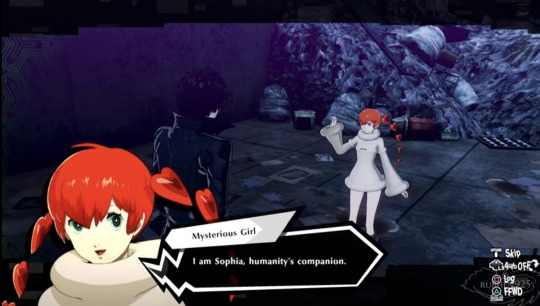
Mysterious Girl: I am Sophia, humanity’s companion. Video still from Rubhen925
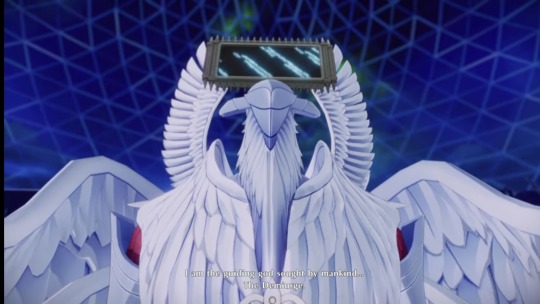
EMMA: I am the guiding god sought by mankind…the Demiurge. I exist…to answer all of your desires. Video still from Buff Maister
In real life, machines won’t “learn” to live with us, but we must learn to live with them; technology is constantly changing, and in life we’ll meet with many different types of machines. They are deeply political pursuits, and as a result they are capable of realizing human impulses that impact others unequally, whether intentionally or unintentionally. We must always stay attentive to their actions and interactions with us, be clear with ourselves about what they can do vs. what they can’t, and carefully tread the path of wisdom with them by our side.
With that….thank you for reading, skimming, immediately scrolling to the very bottom, clicking, and/or stumbling upon this post. There are so many more ways to think about these narratives through machines than what’s presented here, and I expect Fontaine’s mechanical reflections will put Sumeru’s digital surveillance system to shame (not to mention the biotechnological implications of the Narzissenkreuz Institute engineering little Archon children…another important topic for another day), but for now this brain worm is finally getting put to rest. Until next time :)
External Sources
Dualism - Stanford Encyclopedia of Philosophy
Beyond Good and Evil by Friedrich Nietzsche (Pages are given from my hard copy)
L’Homme Machine by Julien Offray de La Mettrie
Gnosticism - Britannica (I am a huge noob about this stuff okay)
The Gnostic Demiurge - Gnosticism Explained
Screenshots from the Golden Slumber from this video by WoW Quests
Screenshot from meeting Sophia in P5 Strikers: https://youtu.be/kEJaAgMwYo0?si=BvNygCh0w_aemGc1&t=74
Screenshot of EMMA: https://youtu.be/7xvC_zss19w?si=CV18F00hua2gIfxp&t=135
A Cyborg Manifesto and A Companion Species Manifesto: Dogs, People, and Significant Otherness by Donna Haraway
The Double on No Subject, the community Encyclopedia of Lacanian Psychoanalysis
The Uncanny on No Subject, the community Encyclopedia of Lacanian Psychoanalysis
The Uncanny by Sigmund Freud
Lore text - Genshin wiki!
Screenshots not attributed are from my own playthroughs. My main account has Lumine, my alt has Aether.
Further Reading
I liked these essays, and they go places that this post does not. I recommend them if you found any of the real-life applications of this interesting 🙂 (will add more to this with time!)
On the Body as Machine by Frank Burres
God in the Machine: my strange journey into transhumanism by Meghan O’Gieblyn
#genshin impact#genshin lore#genshin meta#genshin impact lore#genshin impact meta#khaenri'ah#king deshret#primal constructs#ruin machines#scaramouche#wanderer#sumeru archon quest#caribert#apep#couldn't write a post like this and not pay some respect to the devourer of divinity itself#persona 5 strikers#analysis#genshin analysis#long post
195 notes
·
View notes
Text

VISUAL NARRATIVES
In the realm of religious symbolism, Hindu and Chaldeo-Jewish diagrams stand as captivating landmarks, offering profound insights into their respective cosmologies and philosophical underpinnings. These visual narratives, far from mere aesthetic flourishes, serve as intricate maps guiding the seeker towards understanding the divine tapestry of existence.
Hindu diagrams, like the mandala, explode with vibrancy. Concentric circles cradle dancing figures and blooming lotus blossoms, each element resonating with symbolic depth. The mandala becomes a microcosm of the universe, reflecting the interconnectedness of all beings and the cyclical nature of samsara, the endless dance of life, death, and rebirth. Another emblematic diagram, the samsara wheel, charts the celestial journey of the soul, acting as a poignant reminder of the impermanence of earthly existence.
In stark contrast, Chaldeo-Jewish diagrams unfold with geometric precision. The Kabbalistic Tree of Life, resplendent with ten luminous Sephiroth, meticulously maps the emanation of God's divine attributes into the manifest world. Each meticulously arranged geometric form speaks of cosmic order and structure, inviting the seeker to contemplate the grand mechanisms of creation. The Merkabah, a fiery chariot ablaze with mystical symbolism, transcends its literal depiction to represent the soul's arduous ascent towards divine union.
Though their visual languages diverge, both Hindu and Chaldeo-Jewish diagrams converge in their pursuit of ultimate understanding and liberation. The cyclical dance of samsara and the Kabbalistic ascent of the soul, despite their contrasting styles, resonate with a shared yearning for the ultimate union with the divine. By navigating the intricate pathways of these sacred symbols, the seeker embarks on a transformative journey, striving to align with the cosmic order and achieve liberation, whether through samsara's cyclical dance or the Merkabah's mystical ascent.
Ultimately, venturing into the realm of these diagrams transcends mere academic inquiry. It is a comparative pilgrimage, enriching our understanding of diverse spiritual traditions while revealing the unifying tapestry woven from our collective human yearning for knowledge, self-realization, and connection with the divine. So, let us cast aside the shackles of rigid categorization and embrace the beauty of these ancient symbols. Within their swirling lines and luminous forms lies a hidden language, waiting to be deciphered and whispered to the soul.
Finally, Hindu mandalas' vibrant dance and the Kabbalistic Tree's luminous wisdom whisper across vast chasms of time and culture, finding surprising echoes in early Christian art and mystical thought. Clearly, these fascinating parallels suggest a shared history woven from universal questions about the divine. Let's embrace the whispers, appreciating the beauty of interwoven threads as we explore the boundless canvas of human spirituality. --Rethinking our connection with the Divine Creator
60 notes
·
View notes
Text
"Juxtaposing the robust activism of the 1970s and ’80s with today’s protests underscores just how profoundly retrograde universities’ attitudes and actions have become. “What we’re seeing here is the logical consequence of corporatization, of the sort of culture that emerges from administrative bloat,” said Clifton Crais, a professor of history at Emory University who helped spearhead a vote of no confidence in the university’s president, Gregory Fenves, after police were called to end pro-Palestinian protests. (Seventy-five percent of faculty voted “no confidence” in Fenves.) “You just have this chasm between the administration and everyone else,” Crais told TNR."
...
Indeed, before issuing arrests and suspensions, many admins declared that current protests violate “official university policy.” But there were also violations of university policy in the protests of 1978 and in 1986. What has changed is not so much policy, nor protester tactics. It’s that the schools have become less willing to accommodate activism itself.
Besides, many administrators have shown themselves indifferent to following their own policies, bringing in police in defiance of agreed-upon procedures. Emory University policy dictates “that the only time you can call in the police is when there is a threat to life and the destruction of property,” Crais, who helped author the school’s policy on open expression, told TNR. “And we simply have had neither of that.”
...
That hasn’t stopped university admins from justifying their use of outside law enforcement in the name of “safety.” ...This rhetoric is deeply disingenuous: Police at Chapel Hill reportedly dislocated one protester’s shoulder. Police at Columbia threw a protester down stone steps. Police at UT Austin pepper-sprayed students and detonated stun grenades. Police at Washington University in St. Louis arrested one demonstrator—a history professor at Southern Illinois University Edwardsville—so violently that he was hospitalized with broken ribs. Days after the Columbia police action, the NYPD admitted a sergeant “accidentally” fired his gun inside a building where protesters were being forcibly removed. This past weekend, police forcibly removed protesters from the commons at the University of Virginia by using chemical irritants. Such actions beg the question of exactly whose safety is of concern.
In fact, during the one instance when a police presence might, theoretically, have been helpful—when, that is, a group of around 200 counterprotesters began viciously beating UCLA students on April 30—it took cops more than two hours to arrive to defuse the violence. When LAPD did show up, they shot students with rubber bullets.
#apartheid#us politics#police state#american imperialism#free palestine#student protests#student activism
21 notes
·
View notes
Text
Say When
A/n: I got a little carried away, but every time I’ve heard this song after getting into MW2, I couldn’t not think of Ghost. Tagging @flaneurpastel bc they asked to be tagged for Ghost content. Hope you like it! 👉🏻👈🏻

See you there
Don't know where you come from
Unaware the stare from someone
Don't appear to care that I saw you, and I want you too
When Ghost first saw you, it was from the back of the room. He watched as Laswell introduced you as the newest member of the team, strong, capable, reliable, efficient. Everything a soldier should be and more. He watched as your eyes coolly regarded everyone in the room, gaze flitting from one person to the next, mentally appraising them. He watched the gears turn in your head as your eyes finally landed on his peering at you through his balaclava.
What's your name? Because I have to know it
You let me in and begin to show it
We're terrified, because we're heading straight for it, might get it
Everything in him itched to approach you after the meeting, he didn’t care about your accomplishments as a soldier, he didn’t care that you were a lethal force all on your own, all he knew was that he wanted to know you. The impulse terrified him, and yet it thrilled him all the same. The lick of humanity that shot up his spine. Ghost settled for just watching your interactions with the team, your airy laugh when Soap said something ridiculous, your warm smile when Gaz started talking to you, your attentive eyes when Price commanded the room’s attention for a moment. And when the moment passed your eyes landed on him, and they held nothing but inquiry, understanding, respect, and knowledge. The knowledge that you were a goner as soon as you saw him.
Your favorite song plays on the background
All alone but you turn it up now
And everyone is rising to meet you, to greet you
You have yet to utter a word to him directly and suddenly he’s clinging off of every sound that passes your lips, every chuckle, every answer, every question, he wants to hear it all. As the meeting ends, everyone is standing to approach you. Price clapped your shoulder with a strong hand which you amazingly didn’t move an inch for, Gaz gently bumped your shoulder with his fist, Soap tucked you under his arm and ruffled your hair. And then they were gone. And it was just you and Ghost.
Turn around and you're walking toward me
I'm breaking down and you're breathing slowly
Say the word and I will be your man, your man
You look at him expectantly. Air full of waiting. And then you take it upon yourself to move. Your legs carry you right in front him, willing your lungs to remain even as your heart pounded in your throat. Ghost was no better. And he hated it. But, still, he loved the humanity of it. The humanness of his hands going clammy in his gloves, his throat going dry, and his mask becoming a touch too warm. And yet, he hated it. It left room for pain. Room for vulnerability. Worse yet, you reached across the chasm between you, arm outstretched, hand inviting his, and he took it. It was warm or maybe it was just him and you smiled at him, warm and radiant,
“I’m looking forward to working with you, sir.” The words poured from your mouth and it was like Aloe Vera on a sunburn, it soothed the scorch in his throat and raised the hackles of his heart all the same.
“Likewise.”
He’s worse than fucked. But if the widening of your eyes as soon as he spoke said anything, then you know that you were just as screwed as he was.
Say when
And my own two hands will comfort you
Tonight, tonight
Say when
And my own two arms will carry you
Tonight, tonight
Come close and even closer
We bring it in, but we go no further
We separate two ghosts in one mirror, no mirror
It’s been months since you were first introduced. So far you’ve gone on multiple missions together, and it was seamless. You really are as good as Laswell claimed. Laser focus and flexible. You mold around him so well, your awareness of him and his movements, planned or not, were nothing short of simply being his shadow. You fought together, trained together, and as time went on, you ate together, decompressed together, and suddenly where one went, the other would follow. It was unspoken, your understanding of one another.
When one needed space, the other would oblige. But occasionally, it was easy to tell when that requested space was a farce. A defense mechanism. And he’d barrel through it, not unlike the doors he’s kicked down with your eyes watching his six. He’d find you in your room, brim of your eyes red, your hues glossy with tears not yet spilled. You’re fretting about your room, documents in your hands as you insist on keeping yourself occupied. He knows you work through your anxiety by busting yourself, whether it’s cleaning, organizing, typing, working out, training, anything to focus that energy elsewhere.
“I told you I was fine, Ghost.” Your tone was exasperated, the tears dancing on your lashes threatening to fall out of sheer frustration,
“‘Course you are.” He shrugged, leaning against the doorway with his arms crossed,
“Then?” You threw your arms in the air,
“Then, let’s grab a bite.” His words were casual and seemingly uncaring to an outsider, but he knew you haven’t eaten since you got back. He knew you haven’t been taking care of yourself the way you ought to. And he was calling you out. If you denied his request, he’d know you really weren’t alright, and the line of questioning would begin. And you really weren’t in the mood to play 20 questions, so you sighed. You relented and tossed the folder onto your desk and walked away with him.
Later on, if it turns to chaos
Hurricanes coming all around us
See the crack, pull it back
From the window, you stay low
Then the worst happened. Your stubborn ass decided to play by your own rules and now you were in enemy hands. Ghost was kicking himself harder than he ever had. It was stupid. He should’ve forced you out of there. It should’ve been him. You were at his six, as you always have been, your back against his with your gun pointed in front of you. You glanced to your left as you both walked down the empty hall, you caught the slightest glimpse of a red dot on his shoulder and your body moved before your mind could register the intent. With all your might, you shoved back against your lieutenant forcing him to stumble forward. He turned as quickly as he could, watching in abject horror as a bullet pierced your arm and you were tackled to the ground by the very men you were tasked to kill. You managed to wriggle free, with Ghost’s help. Help, being nearly ripping the men in half with his bare hands. He grabbed you by the straps of your vest and started running,
“Stay with me, Sergeant.”
“I’ve got their focus, Ghost, just go. Get the intel to the RV point and I’ll meet you there.”
“Negative.” You fucking idiot.
The one time he desperately needed you to listen, and you didn’t. You waited until he was through the doorway before you shoved him again, ignoring the white hot pain that seared your arm, and closed and locked the door behind him. It sent him into a rage. The synapses in his head going into overdrive, Ghost was telling him that you had a point and he needed to finish the mission but Simon wanted to rip the door off its hinges and bring you with him.
He cursed as he started running. Shouting into comms that you were on your own and about to be overrun. That was the last he’d see of you for a while. It made him nauseous to think about your smile, to recall your laughter that rang in his ears. That didn’t matter. The only thing that he cared about was bringing you home.
Say when
And my own two hands will comfort you
Tonight, tonight
Say when
And my own two arms will carry you
Tonight, tonight
Come across, you're lost and broken
You're coming to, you're slow and waking
You start to shake
Still haven't spoken, what happened?
He has you in his arms. Smaller than he’s ever seen you. He’s holding on so tight and so gently at the same time, willing the strength in his arms to be just enough to keep you against his chest without causing you further pain. Your small fist is curled against his heart, your head tucked into his chest, your breathing labored and your eyes never leaving his.
“I’m sorry.” Your voice was so quiet, throat hoarse from crying, screaming, god he didn’t want to think about it.
“Stop it.” His grip tightened ever so slightly, new rage forcing bile to rise in his throat,
“Ghost, please, I-”
“That’ll do, sergeant.” He was short. His words clipped and cold. But you knew he was anything but.
I'm coming back and you just don't know when
You want to cry but there's nothing coming
They're gonna push until you give in, say when
Even now, sitting in the infirmary beside your bed, every bone in his body, every fiber of his being was telling him to run. To get the fuck out of here. He refused. He sat by your bed, watching your chest rise and fall steadily, eyes never leaving your closed ones. Watching to make sure the nightmares that would eventually plague you, wouldn’t do so on his watch. You seemed peaceful. He only got to watch you sleep a handful of times, usually only when he was taking the first watch. But even then, it was never a deep sleep. It was always light enough to be roused at a moment's notice. But now? Nothing could wake you. He was relieved in a sense but it didn’t help the lump in his throat when he’d hear you stir. The quietest whimpers, the lightest twitch of your fingers, the heavy breaths that’d leave your nose, it kicked him into overdrive. He crossed the distance in two steps and gently shook you, his heart breaking as you woke up with a flinch, hand flying to the one gently shaking your shoulder, eyes wide with fear and survival.
“‘S just me, sweetheart.” His voice was soft, sad, and unfamiliar in tone. Not like you didn’t look like a stranger to him either.
“I’m s-”
“You apologize one more time, and I’ll knock you out.” There was a light, tentative, humor in his voice, one that you desperately cling to,
“Right. Habit.” You chuckled weakly, the smile nowhere near touching your eyes, but you tried. And you’d keep trying for him.
“I know.”
The silence hung in the room as your heartbeat settled back to normal, your hand still on his as it rested on your shoulder. His touch was an anchor and a catalyst all the same, suddenly the tears sprung to your eyes, the knot in your throat tightening and bringing a bitter taste to your mouth. Your shoulders started to shake as you bit hard on your quivering lower lip,
“Ghost…” You choked on his name as the single syllable passed through your lips,
“I know.”
Now we're here and it turns to chaos
Hurricanes coming all around us
Another crack throws you back from the window
You stay low
All began with the man of country
Another plan sends another century
Around again another nation, fallen
He was furious when you volunteered yourself for a mission so soon after being cleared. Everything he swallowed down for your sake, every acidic thought that eroded his mind, came to life. And it made him sick. For fuck’s sake there’s no way you were this reckless.
“Ghost, I’m fine!” You argued throwing your things to the ground. You’d finally reached the safe house and you were both sore, exhausted, and run down. And it seemed like now he was finally ready to rip into you, you were trying to keep your voice level. Forcing every ounce of understanding to come forward, remembering every look he’s given you up to this point. He was blaming himself and he didn’t know how to tell you. He didn’t know how to deal with the festering acid that had been bubbling for weeks since he brought you back. Since you first took that bullet for him.
“Why couldn’t you have listened?” He threw his own things down to the floor, eyes furious and searching yours,
“I was doing my fucking job, Ghost.” You were never afraid to push back, it’s what he admired most about you. Even if it brought you to trouble,
“Don’t give me that shit.”
“What else was I supposed to do?” One of your hands ran over your hair, the anxious energy bubbling,
“You shut-”
“Don’t fucking ask me to stand by and watch you get shot.” Your eyes narrowed to slits as your chest touched his,
“Watch your tone, sergeant.” His voice was low, a warning growl, his chest was rising and falling as the anger pulsed in his veins, forcing his fists to clench and unclench at his sides. You caught the movement in the corner of your eye and straightened your shoulders,
“Whether you like it or not, whether you allow me to or not, I’ll always have your back. For that, I will never apologize.”
The rage went from a smoldering fire to a stream of ice going down his spine.
Don’t say that. Please, god, don’t fucking say that.
He raised his hand and gently placed it on your arm, his thumb gently stroking the area of the wound through the fabric of your shirt. The action seemed to smooth your edges as much as it did for him.
“I know.”
Any guy can be on both sides of a coin
Never understood why
Some of us never get a shoulder, shoulder
Some of this we kept with us
All of us will go out there
'Cause it never stops until we give in, give in
To give in, give in
After the mission was completed, he never left your side. He didn’t before but he especially didn’t now. He became your shadow as much as you were his. You’d find his eyes in the corner of the room, focused on you, he’d nod his head at you when you’d land a punch on a rookie during training, he’d back you up during briefings when you struggled to find your voice. He was your quiet support. Giving you the extra push to fully bring you back into the fold.
But that wouldn’t change the nightmares. It wouldn’t change the fact that you laid awake in bed until morning call, it wouldn’t change the fact that you’d prefer the comfort of the treadmill to that of your bed when you’d get bored of just laying there. He’d find you there. Eyes focused forward, chest heaving, as you sprinted with everything you had. He wanted to say something but he couldn’t. He’d be a hypocrite if he did. Still, he couldn’t stand to see you like this either. Dark circles under your eyes, skin pale, deep crescent moons in your hands where your nails met the skin of your palms.
You became aware of his presence and gracefully, albeit shakily, stepped off the treadmill once it slowed to a stop. He didn’t have to say anything, just jerk his head and he knew you’d follow after him. You did. Without question, you always would.
Say when
And my own two hands will comfort you
Tonight, tonight
Say when
And my own two arms will carry you
Tonight, tonight
Say when
And my own two hands will comfort you
Tonight, tonight.
You were in his room, sat on his bed with him sitting beside you, facing you. He waited, waited for you to find the words he knew you needed to say, waited for you to turn and face him. And you did. Like a compass, you’d always find a way to face him. Once again, his hands found your arms, and slowly they made their way up until they slotted perfectly at the crook of your neck. His massive hands cradling your head, gently bringing you closer until your foreheads touched. You could feel the heat of his breath through his mask,
“Ghost-” Your voice shook, your hands trembling as they came up to rest on the same spots on his neck. Tears welling in your eyes as looked into his, seeing only the softest part of him,
“Simon.”
Your eyes widened and the new knowledge seemed to encourage the tears to stream down your cheeks. You tested his name, once, twice, until it was a broken sob and you threw your arms around him, burying your face into his neck, clutching the fabric of his sweater in a white knuckle grip. His arms curled around you, bringing you in closer, his eyes closing as he committed to memory every dip and curve of you under his hands.
“I’ve got you, sweetheart.”
#simon riley x reader#ghost x reader#simon ghost riley x reader#cod x reader#mw2 x reader#cod one shot
198 notes
·
View notes
Text
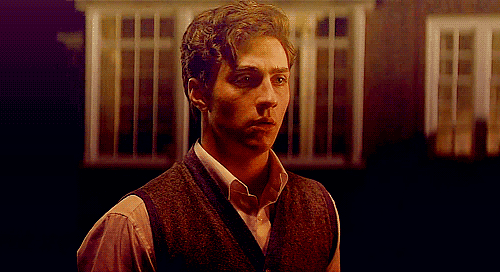
𝗙𝗮𝗹𝘀𝗲 𝗟𝗼𝘃𝗲
𝗘𝗖𝗟𝗜𝗣𝗦𝗘𝗗 ▰▰▰▱▱▱ Volume: James Potter
𝗠𝗔𝗦𝗧𝗘𝗥𝗟𝗜𝗦𝗧

Genre: ✘
Paring(s): James Potter x Fem!Reader
Summary: You were never his, and he was never yours
Disclaimer(s): Cursing, no plot- just love writing angst

Y/N's footsteps echoed through the room, each one a heavy burden upon her anguished heart.
The weight of sorrow hung in the air as she struggled to catch her breath, the labored gasps a desperate attempt to fill the void within. James, his soul laid bare, sat on the edge of the bed, his voice a fragile whisper, pleading for her presence.
But as he spoke, his voice trembled, shattered by the raw ache that consumed him.
Tears clung to his lashes, shimmering like crystalline fragments of his broken spirit.
His once-lustrous brown curls now tangled and disheveled, mirroring the chaos of his inner world. Beside him, his round glasses lay discarded on the table, a silent witness to the blurred vision of his heart.
"Please sit," he implored, the words escaping his quivering lips, bearing the weight of a plea that reached depths unknown. It was a plea not only for physical presence, but for a chance to bridge the vast emotional chasm that had grown between them.
Y/N's anger flickered, a flame of resentment in her weary eyes. Her response dripped with bitter defiance, her voice laced with an undercurrent of pain.
"No," she spat, her words a testament to the searing ache that had settled within her.
Her pacing resumed, a desperate attempt to outrun the painful truth that haunted their connection. The weight of her words settled heavily upon the room, the silence pregnant with unspoken anguish.
"You still love her, don't you?" Her voice, barely a whisper, wavered, revealing the fragile vulnerability that lay beneath her anger. It was a question laced with heartache, the very essence of her deepest fear now laid bare.
James froze, his entire being stilled in the face of her heart-wrenching inquiry. Tear-filled eyes averted, his eyes sought refuge in the safety of the floor, unable to confront the devastating truth that had shattered their world.
In that profound moment of silence, the weight of their unspoken emotions threatened to engulf them both, leaving them adrift in a sea of broken dreams and shattered hopes
Y/N's hands clenched into her hair, her trembling lip betraying the torrent of emotions coursing through her.
James, a desperate flame of denial burning within him, reacted with haste, rising from the bed and drawing himself close to her.
His hands reached for hers, gently prying them away from her tear-stained face.
"No, no, I love you," he sobbed, his voice a broken plea, desperately attempting to convince her of his devotion.
But the unspoken truth hung heavily between them, an invisible specter that whispered in their hearts.
Deep down, they both knew that his heart belonged to another, a reality that overshadowed their connection, rendering their love fragile and incomplete.
Y/N struggled in a feeble attempt to break free from the grip of the curly-haired boy, her heart heavy with anguish.
Yet, he refused to let her go, pulling her closer, his touch desperate and unsteady. With a tear-stained cheek, he pressed a sloppy, bittersweet kiss upon her face, leaving a trace of salt mingled with their shattered love.
"Please," he cried, his voice cracking with a profound sorrow that resonated through every fiber of his being.
He held her tightly, his arms enveloping her trembling form as he cradled the back of her hair with a tenderness born of desperation.
He clung to her, yearning to keep their fragile connection intact, as if by sheer force of will he could mend the fractures in their broken bond.
She weakly struck at his chest, her blows feeble and devoid of anger. Her sobs engulfed her, the sound of her broken spirit echoing against his chest.
It was a feeble attempt to channel her pain into frustration, a futile struggle against the overwhelming tide of emotions that threatened to drown them both.
"Was I just a shitty way of getting over her?" she hiccuped, her voice trembling with a mix of vulnerability and pain.
She fought to stifle her sobs, desperate to maintain some semblance of composure amidst the overwhelming emotions that threatened to consume her.
James, tears streaming silently down his face, cast his gaze upward, fixating on the ceiling.
In the depths of his despair, his heart shattered with the weight of her words, understanding the devastating truth they held.
"I really do love you," he sobbed, his voice breaking with the weight of his emotions. With an agonized determination, he pulled her even closer, until their bodies were tightly pressed against each other, seeking solace in their shared embrace.
Slowly, they lowered themselves to the ground, their movements marked by the heaviness of their hearts.
His arms enveloped her, cradling her fragile form against his chest, as they rocked back and forth, their bodies intertwined in a dance of sorrow and longing.
She shook her head, her face contorted with anguish and disbelief. "You don't, James," she whispered, her voice cracking under the weight of her shattered heart. The pain in her words echoed through the room, suffusing the air with a profound sense of loss.
James let out a gut-wrenching whimper, his grip around her tightening instinctively. It was as if he hoped that by holding her closer, he could bridge the insurmountable distance that had grown between them.
But his grip, filled with desperation, couldn't erase the truth that hung heavy in the air.
"You love Lily, you always have," she whispered, her voice laden with aching resignation. Her words cracked once again, the pain seeping through each syllable.
She had known deep down that she had been the other girl, a mere distraction in his heart's relentless pursuit of Lily.
James whimpered again, the sound gut-wrenching and filled with regret. He swallowed hard, attempting to suppress a sob that threatened to consume him.
"I'm sorry... I'm so sorry," he pleaded, his voice breaking and whining, a wounded animal seeking forgiveness.
The weight of his remorse hung heavily in the air, his words a desperate plea for absolution that seemed perpetually out of reach
"I love you, James," she uttered, her voice shattered and filled with raw vulnerability.
Though she knew deep down that his love belonged elsewhere, she needed to hear those words from him one more time. It was a plea born out of desperation, a desperate grasp at a fading glimmer of hope.
James, his own heart heavy with the weight of their fractured love, met her gaze, his eyes brimming with unshed tears.
He understood the depth of her longing, the yearning for a love that could never truly be fully reciprocated.
His voice trembled as he mustered the strength to respond, wanting to offer her solace, even if it meant sacrificing his own happiness.
"I...," he began, his voice caught between a whisper and a sigh, as he fought against the painful truth. In that moment, his love for her mingled with the lingering echoes of his love for Lily.
The words hung in the air, the unspoken confession that they both clung to, knowing that the reality they faced was far from the ideal they had yearned for.
With a sigh that carried the weight of her suppressed tears, she let go of her breath, her emotions simmering beneath the surface.
Weary and exhausted, she rested her tired head back on his chest, seeking solace in the familiar rhythm of his heartbeat.
“I love you too," he finally whispered, his voice tender and filled with a mixture of longing and remorse.
As he cradled her fragile body, he offered a small glimmer of solace amidst the turbulence of their emotions. In that moment, he held her with a gentleness that spoke volumes of his affection, a silent apology for the pain he had caused.
#james & peter & remus & sirius#james#jamespotter#james potter#james potter angst#angst#james potter imagine#james potter x y/n#james potter x you#jamespotter imagine
83 notes
·
View notes
Text

@strywoven approaches with an inquiry for THE PROPHET —
' if you want me to go, then you'll have to tell me to leave. ' / kaen.
PROMPTED FROM HERE

A GREAT ASPECT ABOUT BECOMING A PROPHET — of becoming a con-man, of becoming a god to others — was to learn to familiarize oneself with sweet sentiments. Desperate people always say desperate things; gutted promises that he would come to reap upon the most unexpected circumstances, a cheap compensation for the trouble they deposited upon him. He was not unfamiliar with the confectionery taste of begging, nor was he foreign to the sour flavour of despair. People — all of them became predictable soon enough.
In spite of that (because, of course, there would always be someone to prove him wrong), he found Kaen to be a peculiar case. They did not come to him with the same anguished soul others did. He could sense that their heart was a tortured one, buried beneath grief and history, yet they did not seek vengeance within him … nor did they seek salvation. Rather, they seemed to stay simply for the sake of it. Comfort was a foreign concept for a man such as himself, but he knew others revelled in it. Killed for it, in fact. Died for it. So, he supposed, it should not be at all strange for Kaen to seek out kindred spirits; to cling onto them and keep them closer to their already bleeding heart.
Jinhai did not have any family or kin — or, rather, if he did, then he no longer remembered them. His thought was that he must have been separated from them at birth by his mother, or he did not have them at all. Jinhai tried not to spare them too much thought, as it provided no fruit for his endeavours. Such ideas so often rapidly evolved to become distractions, wasting time he did not have. It was futile to care so much about people who didn’t — couldn’t — care for him in return, so he saved his remaining efforts. There were far more important things for him to pay attention to.
Kaen, as sweet and gentle as they might be, was quickly becoming such an inconvenience. In a roundabout turn of events, it seemed Kaen had mistaken him as some kind of … kin. Reflections. Cut out of the same fabric of tenderness. Perhaps, upon the most surface of levels, it would seem that way, but the depth beneath gave way to a chasm too wide to be bridged. They were different, greatly and vastly so, for great reason. Kaen was tender as a ripe fruit; He was tender as a rotten one. They were both bruised, torn at by the shitstorm of survival, but they bled differently: Kaen shed emotions, he did not.
Yet, a smile curled upon the Prophet’s lips; an ugly caricature. It could not be anything else, after all, as he did not experience emotions the way humans did. Only the ideas of them could bear to sustain his stain; one fake for another.
❛ Don’t put it like that. You know I’d never ask you to go if you say it like that. ❜
Speaking. Pleading. Inquiring. It did not matter; Kaen would believe whatever they wished to believe. In the end, victory had already been ensured to fall into the hands of the Prophet.
#strywoven#strywoven \ kaen rolav#i would say i hope he wasn't being too presumptuous but that's literally his job description lmao i'm sorry \\
2 notes
·
View notes
Text
I only wanted to help. I was ashamed, embarrassed, remorseful; defeated. I let the pack down. I let those around me down. Maybe my/our confidence in the workplace should stay down. Maybe our (my?) tendency to speak out and our (my?) meticulous inquiry and task designation needs to just... really not be the presence that it is. Not once has it paid off in the entire 5 weeks we've been working there now. I've risen numerous comments, concerns; halted numerous processes to make sure they're going okay; but... maybe only once have I felt like it was actually worthwhile, like it actually did pay off. And even that instance I knew I was overstepping. I could feel it so bad and so hard. I should've stayed quiet. I shouldn't have said anything. What I need to do is operate in silence save for what is genuinely necessary. Offer nothing to no one. Carry out what's ordered or asked of me promptly and swiftly. Ask questions only to the extent that it's strictly necessary-- nobody has liked the extent of my questioning. I just wanna make sure I get it right. I just wanna make sure I don't screw everything up. I just wanna be thorough and reduce the possibility for error to its elemental. But I can feel the irritation and agitation of my coworkers and superiors. I don't belong here. Not with the people that are here. The job itself is great, honest. I don't not belong doing the job. But I don't belong here, in this workplace. The extent to which I'm an outlier is painful. I can feel it every day: the chasm between me and the others, whoever it is I'm with. Only with the one person have I really connected with naturally and had an affinity toward... and that person is, the circumstances are... It's a situation. Even with that person do I need to lie low and mellow out. "I know when I'm wanted, I'll leave if you ask me to-- mind my own business and speak when I'm spoken to." Those lyrics are how I need to be. I need to mind my own business and speak when I'm spoken to. I need to keep my ears level and my head angled ever-slightly downward, my tail at rest if not lowered somewhat when spoken to. I can only exude my confidence when I'm alone in the rooms with the dogs. I need to exude my confidence there because the person controls the energy of the room with dogs-- I need to be calm, confident, and chill in order to keep the dogs calm, confident, and chill. But when it comes to the other humans? I am smothering; the devouring mother archetype. I need to simply do as I do without consulting someone else unless it pertains to... I don't know. I can't even think of a solid rule of thumb right now. Clearly "at my discretion" is not fucking working but I can't think of a qualifier that would work. The others merely do as they will, and sometimes it results in an inconvenience but that's the worst outcome I've seen from this strategy. My strategy, on the other hand... perhaps it's worse than an inconvenience-- it's an annoyance. A nuisance. A leech, a codependent leech. I need to not be dependent upon my colleagues. I need to not hinge what I'm doing upon what they're doing. I'll just take the list of tasks that need completing for whatever it is and start doing it. Maybe I shouldn't really even keep track of who's doing how much. ... except to ensure that I'm not consistently freeloading and doing less than my associates. I don't know. This part isn't a good strategy admittedly-- it would be the exact same problem if I just went ahead and did everything without telling them: me overstepping the line.
[TBC-- character limit]
2 notes
·
View notes
Text
echo
They say that she is Prometheus’.
But Chione cannot say for certain if she really is.
“It makes sense that you can scarcely recall it,” Boreas mused, taking a delicate sip of tea from the cup sitting in his hands. He looks thoughtful. “Your conception, I mean. Most creations are lucky to recall it at all. Your minds are often too feeble to grasp it.”
Mournfully, his eyes turn downcast from behind his white mask. “He has likely made you to abate the loss in his heart, after Epimetheus’ sudden return to the star. I’m not surprised that he's thrown himself headlong into nurturing you.”
She nods along, pretending to understand the words coming from his mouth despite knowing nothing at all. Chione hardly grasped words, language being foreign to her. Whenever she speaks, it comes out garbled and mangled, a mockery of the eloquent speech proper Etheiryians spoke. A reminder of her place among gods.
Chione lives in a paradise, in a land that had no parallel or equal in its majesty. Everyday, she marvels over creations and man alike, captivated by the world around her not unlike a newborn baby. No one should be surprised by her childlike demeanor- not unlike Meteion’s- when Chione hardly grasps others’ existence, let alone her own.
And how can she? How could she even begin to fathom her own existence at present when she cannot comprehend her own birth? Prometheus has yet to tell her during their daily travels, even when their hands are interlocked and he shows her their his world.
It’s hard for Chione to feel fully at ease anymore. She has always been fond of their travels, of seeing the world in all its glory and meeting its denizens, but her heart grows uneasy at night, when she's in bed tucked away in her own thoughts.
Perhaps she is Prometheus’ creation, a reflection of his will to have a partner on his travels. It would make sense, she does have a piece of his soul after all. But she isn’t sure. She can’t be sure. She doesn’t even remember her own birth. Is Chione even her name?
Prometheus listens to her worries sincerely, unlike anybody else. She voices them nearly every other day, and every other day he takes her hand once more, and gently abides her concerns.
“Fret not my dear,” Prometheus smiles down at her as he kneels to her height. At times, she feels like a petulant child that needs his coddling and comfort. “I understand your concern, but you need not have fear. Whether or not you can recall your origin is of no consequence. What matters is your present. Now come, let us go, there is still much for us to see and do.”
Dutifully, Chione bobs her head up and down, making a noise of discontentment as he adjusts her bone white mask, so very identical to his own, tucking both her hair and horns carefully beneath it. He chuckles, not missing the rather petulant look across her face as he attends to her. As his creation, there is of course a piece of his own eccentric nature within her. What he is not responsible for, is the growing chasm of emptiness within her heart.
Trailing behind Prometheus as he performs his daily duties is something Chione does without question. She doesn’t question much at all, other than the small inquiries about their society. Prometheus always answers her earnestly, always happy to teach her something, and he encourages her to be open with him.
He is an important man, she can tell, even with her short life and limited knowledge. People everywhere they went utter his title with awe and astonishment, hardly sparing her a glance. The word, the title Azem is treated with such reverence, and Chione understands why. He treats everyone around him with grace and humility, an air of fatherly affection about him. He nurtures the world and people in his life as much as he nurtures Chione, gingerly running a finger over the waxen petals of a flowering sykon, murmuring hushed words of encouragement to an child when they struggle to muster the best of their magicks, and gently sliding a slice of apple past Chione’s lips to feed her.
Wherever he went, Prometheus wanted everyone and everything to flourish in his wake, to see them blossom.
That includes Chione.
#madd writing#madd#beau writes#Beau rambles#I haven’t posted writing here in a while. I like to think I’ve improved a lil#may or may not make a part two! or just make a post rambling about this paracosm in general hehe#pre-sundering
2 notes
·
View notes
Note
Places the Elden Lord's crown before her.

Long has Rennala abandoned the crescent crown she once wore so proudly, the garb gathering dust in the corner of their chamber. Instead, her hair falls over her shoulder freely, her fingers now weaving the strands into a loose braid. It occupies her mind just enough to keep her mind from plunging back into the chasm she lost herself in for so long, her escape yet but a feeble thing that threatens to shatter should she losen her grasp on reality. A reality in which her kingdom has long turned into ash, the stench of slain men and women rotting away permeating the air.
A reality in which Radagon freed her from what should have been her tomb.
When he enters the room, his presence draws her eyes to him immediately. Even after all this time, after all the heartache... Rennala finds herself incapable to hold onto her grudge and agony long enough to feel a mere modicum of pure, genuine hatred.
Quietly, she watches him oh-so-closely as he places the piece of metal before her ─ the crown of the Elden Lord, the consort to Queen Marika. First Godfrey, than Radagon. Marika and Radagon, two pieces of a whole, interconnected in ways that Rennala shall never understand. But Marika is gone whilst Radagon remains bound to duties that were hers once. No longer is he a part of her, and she no longer a part of him.
A soft exhale slips past Rennala's lips. "I will ask thee once, and only once, my dear Radagon," she begins, slowly and carefully, and takes one of his hands between both of her own. " ─ Art thou certain?"
Mayhaps her inquiry is unjust in light of the fact that Radagon returned to her side once he was freed of his shackles, and took the burden of looking after her upon himself when naught prevented him from averting his eyes from the broken shell of the woman she had become. Still she needs to ascertain herself, and she feels that, after everything, she has the right to.
But a simple 'yes' from Radagon's lips will be more than enough.
#ordervessel#( ic : rennala )#tbh it does feel like that'd be a proposal again so ya know...#and i'm just assuming here that... radagon would be honest about (almost?) everything by then.....#whenever rennala is herself enough again to listen and ask anyway dshfjk
6 notes
·
View notes
Text
𝒻𝑜𝓇 : @pclarnight !
𝔣𝔢𝔞𝔱𝔲𝔯𝔦𝔫𝔤 : wolfram & dahlia .
𝕝𝕠𝕔𝕒𝕥𝕚𝕠𝕟 : wagner apartments .
𝐇𝐄'𝐒 𝐈𝐍 𝐇𝐈𝐒 𝐁𝐄𝐃𝐂𝐇𝐀𝐌𝐁𝐄𝐑𝐒 𝐅𝐎𝐑 𝐓𝐇𝐄 𝐑𝐄𝐌𝐀𝐈𝐍𝐃𝐄𝐑 𝐎𝐅 his recovery, the insomniac habits that lure him into the deep chasms of night rendering him unable to relax, or at the very least, shut his eyes & rest. to finally sleep, void of any sentiment, especially one that resurfaces in the image of black fluff. his canine companion that would have already undoubtedly shoved himself underneath the thick layers of cotton that staple him to the bed. a hollowed sigh as he shifts to grab the glass of water atop a messy drawer. a choice to stick with the lights off & windows barricading any ounce of sunlight via blackout curtains that hang over them. it's the creak of his bedroom door that causes hackles to suddenly raise, discolored hues staring straight for it. who could it have possibly been now ? he'd waved off anyone who made an effort to enter. not in the mood for guests, false personas that offered sweet treats & the like as a means to talk matters of revenge. scheming. it's a silly thought that causes him to laugh in their face, eyebrow risen with every inquiry that they shoot his way. the door is pushed further open as his eyes attempt to adjust to the chandeliers that illuminate the hallway. ❛ do i have to write 'fuck off' on the doorframe for you lot to get the picture ? ❜

#* ━━ w. wagner › colloquy.#* ━━ colloquy › ft : dahlia.#smth abt odd pairings that make me go coocoo bananas .#* queued .
2 notes
·
View notes
Text
*The canis lupus desmodus rotundus narrows his cobalt optics, carrying his upper apendage to the length of his unguis in first skepticism a spirit of inquiry. He remains complaisant, inclining his cranium in a repetitive motion, now overcome with the sentiment of assimilation, comprehending what materialized in particular to his visual perception.*
"Ah, yes… My VAMPWOLF senses, they can read your minds of their befuddlement, baffled by the sudden appearance of my visage.. FEAR NOT, dear LOVEBIRDS, I, EDWARD LEGOSI CULLEN, have HEARD THE WEEPING CRIES OF THE CHERUBS! Oh how their TEARS fall from the heavens, echoing down a waterfall, a river leading to the DEEPEST DARK of chasms… That make up your poor, poor souls. BUT, I shall not allow this EMPTINESS to TAKE OVER! I will FILL THAT HOLE, THAT WELL that has been GAPING for so, so many years…"
4 notes
·
View notes
Text
@reginrokkr liked for a starter.

His silent gaze rests heavily on the stranger, though perhaps the term isn't entirely accurate anymore. Xiao doesn't know his name, but they have met once near the Chasm. How strange that their paths would cross again so soon. "What do you seek in these mountains?" he asks, aware that his inquiry all but mirrors that of their last encounter.
7 notes
·
View notes
Text
How to Use Google Ads to Promote Wellness Services in Dubai?
What's all the buzz in the competitive wellness market of Dubai? Effective marketing of services can be the difference between crossing the chasm and falling into oblivion. Google Ads is an important platform for reaching potential customers on which wellness centers, fitness studios, and spas can thrive for their business. Here's how you can explore ways to make the most out of these precious tool insights from Brandfell Technologies, a Google Ads Partner Agency Dubai and a wellness marketing specialist ahead:
1. Understanding Your Audience
First, to be successful in the making of a Google Ads campaign, one has to identify the people whom they target. If you are running a yoga studio, a fitness center or even a wellness spa, Digital advertising for wellness services has got to be specific. Brandfell Technologies, the top Google Ads Partner Agency Dubai, can analyse, categorise, and segregate demographics, interests, and online behaviour of the audience in such a manner that ads are delivered to the relevant target audience.
2. Building effective ad campaigns with Google Ads Partner Agency Dubai
Wellness centers should avail themselves of Online promotion for wellness centers. Google Ads will enable you to set up Targeted ads for wellness centers in Dubai so that your message will pass to local searchers who require services like yours. Brandfell Technologies, the best Google Ads Partner Agency Dubai, recommends you set up location-based targeting so that foot traffic and inquiries from residents or tourists looking for wellness services nearby will get easy access.
3. Use Paid Search for Lead generation for wellness services
Lead generation for wellness services is an important objective of every wellness center. Paid search for fitness studios in Dubai, like Google Ads, can create qualified leads in a short time. With a Google Partner for wellness marketing, your wellness center can turn visitors into clients with compelling ad copy, targeted keywords, and great landing pages.
4. Using Google Ads for wellness
The well-being industry flourishes well on customer trust and personalisation. With the proper implementation of Google Ads, you widen the light on your brand. Whether you are promoting massage therapies or holding classes for fitness or holistic treatments, paid advertisements increase the possibilities to stand out. Thus, the wellness industry paid advertising entails working with Brandfell Technologies so that campaigns will be more target-based and optimised towards results.
5. Google Ads campaign audit for wellness centers for Continued Success
One crucial aspect of wellness center marketing is to ensure that campaigns remain effective on a year-round basis. A Google Ads campaign audit for wellness centers by Brandfell Technologies shall help the well-being center discover what works and where adjustments should be made. Let's get started with a Dubai wellness center marketing via Google Ads so it remains cost-effective and impactful.
6. Measuring Results
You can measure success online for wellness services in Dubai. To measure the success of Online advertising for wellness services Dubai, the proper metrics are to be observed. Measured by essential indicators like click-through rates, conversion rates, and cost per lead, you will know if your campaign is doing well or not. By making data-driven decisions with a Google Ads expert, regular monitoring will help boost return on investment.Google Ads is also one of the must-engage-with essentials for Online promotion for wellness centers. From Lead generation for wellness services to brand awareness, such as a marketing platform, you need a professional Google Ads Partner Agency Dubai like Brandfell Technologies to manage carefully, can be the ultimate makeover for your wellness business. Be it Paid search for fitness studios in Dubai, a wellness center, or more, Google Ads can be that 'difference maker'.
#best seo services in dubai#digital marketing services in australia#digital marketing services in dubai#digital marketing company in australia#branding agency in uae#branding#social media advertising company in dubai#best digital marketing agency in australia#digital marketing agency in australia#social media marketing company in dubai
0 notes
Text
Unraveling Conflict: The Art of Finding Common Ground
In the labyrinthine corridors of human interaction, conflict lurks, waiting like a shadow, ready to pounce upon the unsuspecting. It is a perennial dance, an intricate ballet where words become weapons and silence speaks volumes. Yet, amid the cacophony of discord, a melody of resolution beckons—a soft whisper promising understanding, collaboration, and, ultimately, harmony. This is not merely a call to arms, but an invitation to engage with the complexities of disagreement, led by the illuminating insights of Mike Gregory, a distinguished Leadership Keynote Speaker.
Imagine, if you will, the parched earth of animosity, yearning for the rain of empathy. In a world increasingly polarized, where opinions clash like thunderclouds, Gregory's approach to conflict resolution emerges as a refreshing downpour. He advocates for the principle of educating judiciously—a concept not steeped in dogma but one that emphasizes the art of listening, understanding, and bridging the chasms that divide us. It is a philosophy that transcends the mundane skirmishes of everyday life and reaches into the depths of our shared humanity.

The journey begins with a simple yet profound shift in mindset. Instead of perceiving conflict as an adversarial game, imagine it as a grand tapestry woven with the threads of diverse perspectives. Each argument, each disagreement, adds color and texture to the fabric of our existence. Here lies the opportunity to reframe our approach—transforming adversaries into allies, and problems into possibilities.
In this quest for common ground, we must embrace the power of active listening. This is not a passive endeavor; it requires a deliberate act of opening our hearts and minds. The essence of active listening extends far beyond the superficial exchange of words. It is the art of seeking out the shared values and unearthing the hidden interests that drive the opposing party. One must ask: What do we hold dear? What aspirations linger just beneath the surface? By delving into these inquiries, we can foster connections that breathe life into the most stagnant of discussions.
Yet, to educate judiciously is not simply to speak; it is to engage with honesty, integrity, and transparency. It is the delicate act of offering insights while remaining cognizant of the other’s perspective. In this dance of discourse, trust is the most fragile yet invaluable currency. One must earn it, nurture it, and allow it to flourish like a garden in spring.

As we tread this intricate path, let us consider the actionable steps to collaborative conflict resolution, a roadmap illuminated by Gregory’s teachings. First, we must adjust our attitudes—be gentle with people yet resolute in addressing the issues at hand. Second, we should seek out common interests and values, crafting a bridge upon which understanding can walk. Third, an awareness of our strengths and weaknesses becomes paramount—who are the players in this drama of discord?
We must then understand the learning styles of our counterparts, adapting our communication like a skilled chameleon, blending into the environment to foster understanding. Choosing a model, be it the “EDGE” framework (Educate, Demonstrate, Guide, Enable) or the “FIFI” approach (Facts, Issues, Feelings, Interests), can help illuminate the path forward.
Thus, the takeaway is clear: conflict, when approached with an open heart and a willing spirit, need not be a cataclysm but a crucible for transformation. Through the lens of collaboration, we can transcend the discord that divides us. If you seek guidance in this noble endeavor, turn to Mike Gregory, a celebrated Leadership Keynote Speaker. Reach him at [email protected] or call (651) 633-5311. Together, let us weave a narrative of understanding, where even the most discordant notes find harmony in the symphony of life.
0 notes